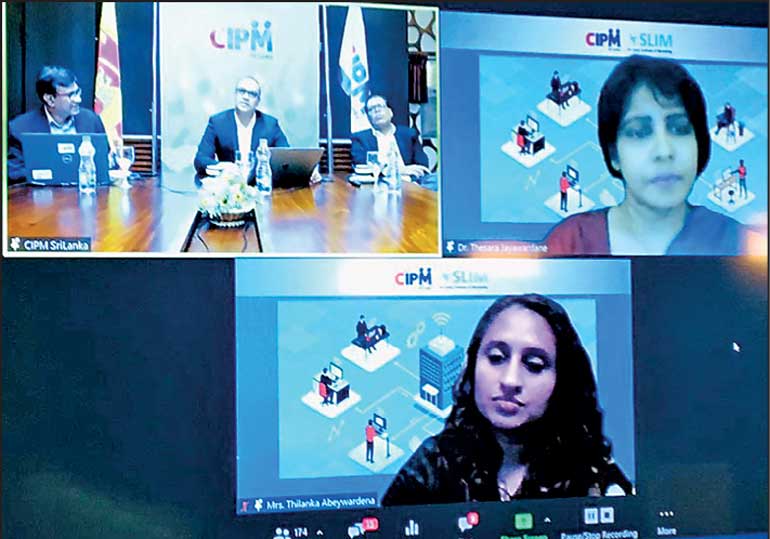Wednesday Feb 18, 2026
Wednesday Feb 18, 2026
Monday, 2 August 2021 00:00 - - {{hitsCtrl.values.hits}}

CIPM Sri Lanka together with the Sri Lanka Institute of Marketing (SLIM) organised a webinar on ‘World of Work is Changing, the Future of Work is Hybrid’ recently to deliberate the pros and cons and implications to organisations, the workforce and the regulators and Government of the new world of work being driven and accelerated by the pandemic gripping the world since early 2020.
CIPM President Jayantha Amarasinghe, CIPM Vice President Ken Vijayakumar, SLIM President Thilanka Abeywardena and SLIM Executive Committee Member Dr. Thesara Jayawardane participated as panellists. The webinar was moderated by CIPM Sri Lanka Past President Janaka Kumarasinghe.
Introducing the topic, the moderator said that the pandemic was able to accelerate the digital transformation which was prolonging for several years, overnight and the world found new ways of working emphasising that the sustenance of hybrid models of working can lead to better outcomes for many stakeholders.
“The way we work is extremely critical for the country to move forward due to multiple and fundamental reasons. We realise the challenges the corporate society, organisations, people and industries are facing due to the pandemic which has been dictating and controlling our lifestyles, the way we work, how we work, the number of people allowed to report to work. However, organizations cannot compromise on delivery of the core values being offered to our customers. The customers are demanding, the regulators are controlling, and health authorities are insisting on health and safety. Employees do not come to office when there is a life-threat. Hence, we need to adapt by adopting new operating models around a sustainable work arrangement solution to ensure business continuity and to support customer demands and society,” said Amarasinghe, adding that the hybrid way of working provides a host of benefits.
Sharing her thoughts Abeywardena said that the pandemic has led to a complete change of the marketers’ role in terms of how to market, sell, handle branch operations, assessing the customer experience leading to changes in all elements of the profession with the advent of the hybrid workplace.
“Can we work the way we used to work? For example, prior to the pandemic digital channels may have been a competitive advantage. However, now it is a bare minimum or a ‘hygiene’ factor – a must have. This also means that customer/consumer expectations are being raised. In response to the pandemic, companies were changing their business models and transforming themselves to cater to customer demands.”
She added that HR and marketing should work together to figure out how to handle front-liners, sales, brands, channels which play a significant role in a pandemic situation.
Responding to the moderator’s question on the workforce related challenges due to the pandemic and resulting hybrid working model, Vijayakumar said: “The employee and employer angles have to be considered in this situation. From the employees’ angle it is a mental block as to whether people can, are prepared and ready to work from home. The employer on the other hand is concerned that employees, although requested to work from home, are not contributing to productivity, adding value so how are salary expenses can be paid.” He added that employers do not prepare the workforce to face the new model of hybrid working which requires a cultural change.
Dr. Jayawardane said worldwide research suggests that close to 18% of workers have occupations which are suitable for working from home, adding that it requires the commitment of both the employer and the worker to be successful and that both should be practical, flexible, sensible and sensitive to each other’s situation, and that in addition to technological considerations, the mental health and well-being of the workers are important considerations in adopting a hybrid working model.